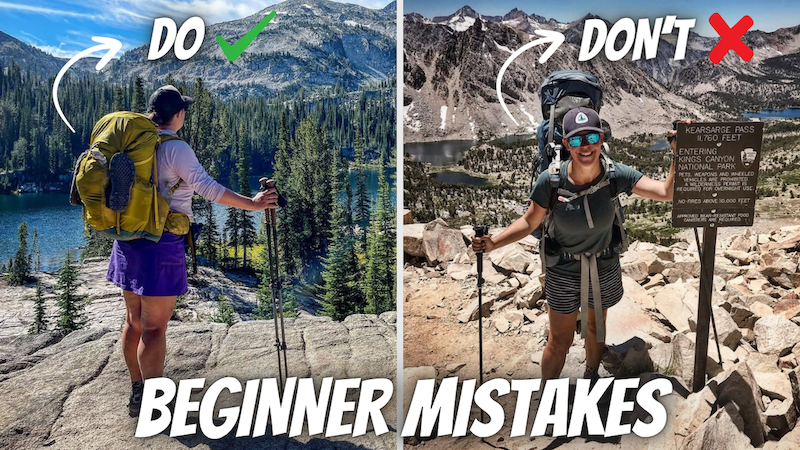
Nine years ago, I went on my very first overnight backpacking trip… and let me tell you, it was kind of a disaster.
My pack was way too heavy, I had no clue how to use any of my gear and I grabbed random freeze-dried meals the morning of the trip. I didn’t have a map, I didn’t check the trail and FUN FACT, I had no idea where we were actually going.
Our “plan”? At a local coffee shop, my friend laid out a paper map, had me close my eyes and told me to point. Wherever my finger landed, that’s where we’d go.
We were trying to escape the rain in town, but instead we got rained on, hailed on, snowed on and blasted by the wind. On day two, we got lost on a short day hike because the whole area was socked in with fog and neither one of us had brought a map.
Why am I sharing this? Because being new to backpacking doesn’t mean your first trip has to be a disaster. You don’t have to learn the hard way like I did.
So here are 10 beginner backpacking mistakes that can ruin your trip and how to avoid them so you can have an amazing adventure right from the start.
Beginner Backpacking Mistake #1: Bringing Gear You Don’t Know How to Use
On my first backpacking trip, my pack was full of borrowed gear and I had no idea how any of it worked. I’d never set up a tent, inflated a sleeping pad, or even used a backpacking stove. Honestly, I was terrified it might explode.
Struggling with unfamiliar gear can turn any trip into a nightmare. Before you hit the trail, practice with everything at home.
- Set up your tent in your backyard.
- Inflate your sleeping pad in your living room.
- Test your water filter and backpacking stove before you go.
The more comfortable you are with your gear, the more confident (and less stressed) you’ll feel once you’re on trail.
Beginner Backpacking Mistake #2: Packing Way Too Much
Letting fear guide your packing can backfire fast. I bought an 80-liter pack for my first trip because I wanted to be “prepared.” Instead, I ended up carrying way too much weight and being miserable.
Here’s the truth: you don’t need that much stuff.
Lay everything out before you pack, and ask yourself: “Do I really need this?” Then, remove half of it.
- Stick to one hiking outfit
- Bring extra socks and underwear
- Practice packing at home
Beginner Backpacking Mistake #3: Wearing the Wrong Footwear
Nothing ruins a trip faster than painful blisters or sore feet.
A lot of beginners think heavier boots = more protection. But if they don’t fit right or aren’t broken in, they’ll wreck your trip.
Choose footwear that matches your hiking conditions:
- Trail runners for warm, dry weather
- Waterproof hiking shoes for cold, muddy, or wet trails
And always break them in before your trip. Your feet will thank you.
Beginner Backpacking Mistake #4: Skipping Physical Prep
The trail is not the place to start training. Even short hikes with a loaded pack can feel brutal if you’re not used to the weight.
A few weeks before your trip, start going on walks, hikes or stairs with your pack. Build up gradually.
Personally, I like to stay trail-ready all year with strength training, yoga and training hikes wearing my loaded pack.
If you need a structured plan, my Ready Set Hike program (inside The Confident Solo Female Backpacker System) walks you through 8 weeks of training so you’re physically prepared for backpacking season.
Beginner Backpacking Mistake #5: Ignoring Weather & Trail Conditions
On my first backpacking trip, we didn’t even know where we were going. We just picked a random spot on a paper map and drove off. The result? Rain, hail, snow and zero idea what we were walking into.
Always check the weather and trail reports before you go. Look for:
- Washed-out or icy trails
- Downed trees or closed trailheads
- Fire warnings or flooding
Knowing what to expect lets you plan ahead – or pivot – so you stay safe and comfortable.
Beginner Backpacking Mistake #6: Not Preparing for Cold or Bad Weather
Mountain weather changes fast. What starts as a sunny morning can turn into a cold, wet mess by afternoon.
If the forecast calls for rain, wind, or snow, bring proper layers and rain gear.
On my first trip, I had none of that. We thought we were escaping the rain… but got snowed on instead. That experience taught me: always be prepared for the worst, even if you hope for the best.
Beginner Backpacking Mistake #7: Lack of Overall Trip Planning
Winging it might sound adventurous, but when it comes to backpacking, it usually leads to exhaustion and stress.
For my first trip, our “plan” was to throw a dart at a map. We ended up cold, wet and worn out, not exactly the adventure I had in mind.
Instead, plan your route and daily mileage. Know your campsites, elevation gain, and where to refill water. Having a clear plan keeps you on track and helps you actually enjoy your time outdoors.
Beginner Backpacking Mistake #8: Not Having a Navigation Plan
Getting lost is scary and completely avoidable.
On day two of my first trip, we left camp to explore, but fog rolled in, we lost the trail and got turned around. We had a paper map (the same one we’d picked our random destination from), but no digital map downloaded.
Now I always hike with:
- A paper map as backup
- A digital map downloaded on my phone using Gaia GPS or onX Backcountry
Even if you’re just day hiking, always have a navigation plan.
Beginner Backpacking Mistake #9: Poor Food Planning
As a food-motivated hiker, this one hits home.
For my first trip, I grabbed random meals at REI the morning we left. Some were great. Others? Not so much.
Don’t make the same mistake. Plan and test your meals ahead of time. Stick with foods you know you enjoy and that are easy to cook (or don’t require cooking at all). And always bring extra snacks.
Beginner Backpacking Mistake #10: Letting Fear Hold You Back
This might be the biggest mistake of all.
It’s easy to let doubt, fear or perfectionism stop you from even starting. But confidence doesn’t come from knowing everything. It comes from taking that first step.
Educate yourself, start small and practice your skills. Every hike you take builds confidence for the next one.
You’ve got this.
Final Thoughts
Now you know what NOT to do on your first (or next) backpacking trip and how to make your adventure safe, fun, and stress-free.
If you’re ready to start planning your own backpacking trip with confidence, I can help! Book a free enrollment call to learn more about my program, The Confident Solo Female Backpacker System. This program is designed to help women plan, prepare, and enjoy their backpacking adventures with confidence—without the stress, overwhelm, or guesswork.
And if you want even more beginner tips, check out: 10 Mistakes Most Beginner Hikers Make (& How to Avoid Them)
DISCLAIMER: This post and video contain affiliate links, which means that if you click on one of the product links, I’ll receive a small commission at no extra cost to you. This helps support my blog, The Hungry Hiker and allows me to continue to create content for you free of charge. Thank you for your support!
